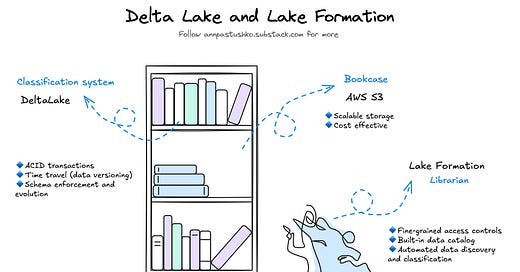🐾Delta Lake and Lake Formation🐾
🤓 At first glance, Delta Lake on AWS and AWS Lake Formation may seem like alternatives, and I often hear people comparing their capabilities. However, you can actually combine them to leverage the best features from each.
Lake Formation
AWS Lake Formation is a data lake management service that streamlines the process of setting up, securing, and governing data lakes on AWS. Think of it as a librarian — it provides governance for your data:
Fine-grained access controls — ensures the right people have access to the right information.
Built-in data catalog — stores metadata about your data, making it easier to discover and manage it.
Automated data discovery and classification — automatically crawls your data, identifies data types, and suggests classifications, helping to organize and secure sensitive information.
Delta Lake
Delta Lake, on the other hand, is an open-source storage layer framework. You could think of it as a library classification system:
ACID transactions — ensures data consistency and reliability, even with concurrent readers and writers.
Schema enforcement and evolution — maintains data quality by enforcing a defined schema and allows for schema changes without disrupting existing data.
Time travel (data versioning) — it's like having a time machine for your data - you can look back at how your data changed over time.
Optimal combination
The optimal solution emerges when you use both technologies together. Extending our library analogy further, we can imagine that S3 is our bookcase, Delta Lake is the library classification system that manages how data is stored, and Lake Formation is the librarian who provides data governance capabilities.
While storing your data using Delta Lake format on S3, you can leverge its ACID transactions and schema enforcement. Utilize Lake Formation to manage data access, employing its AWS Glue Data Catalog for metadata management and automated data discovery. Lake Formation's fine-grained access controls can be applied to the Delta Lake tables. Additionaly, integration with AWS analytics services such as Athena allows for efficient querying of data.
This combined approach provides a robust, secure, and flexible data lake solution that benefits from the strengths of both technologies. You get the data consistency and versioning capabilities of Delta Lake along with the comprehensive governance and security features of Lake Formation, all while maintaining the scalability and cost-effectiveness of S3 storage.
Thank you for reading, let’s chat 💬
💬 Do you use Lake Formation for data governance?
💬 What was the most difficult part of building data lake for you?
💬 Do you experience any issues with data lake built on AWS?
I love hearing from readers 🫶🏻 Please feel free to drop comments, questions, and opinions below👇🏻





